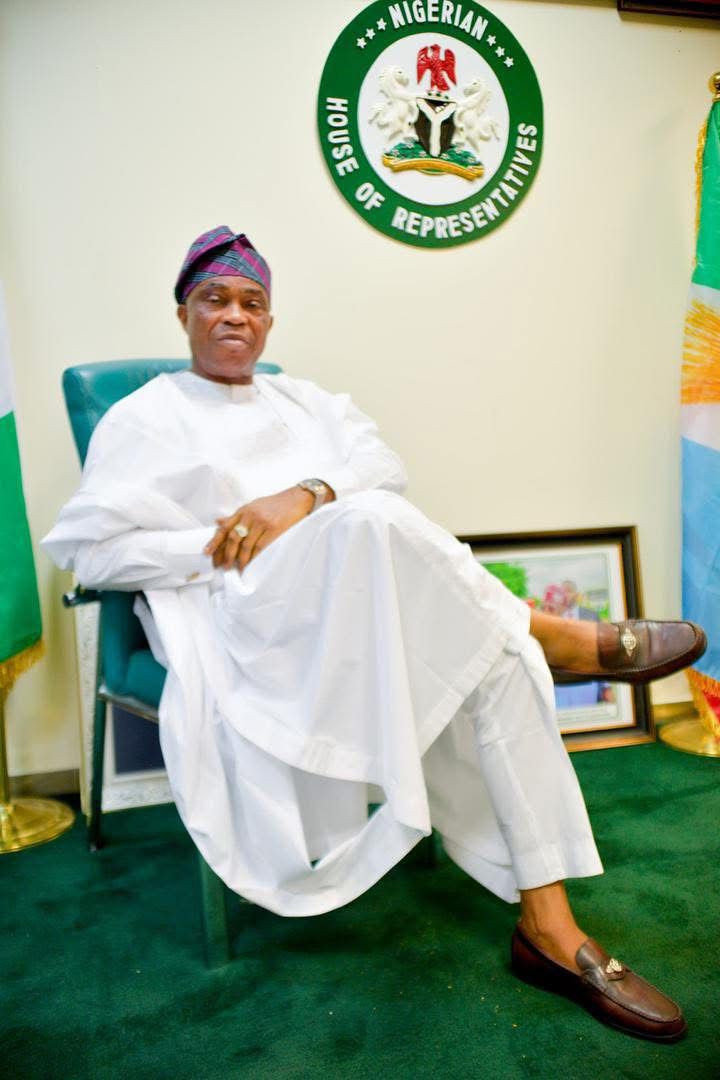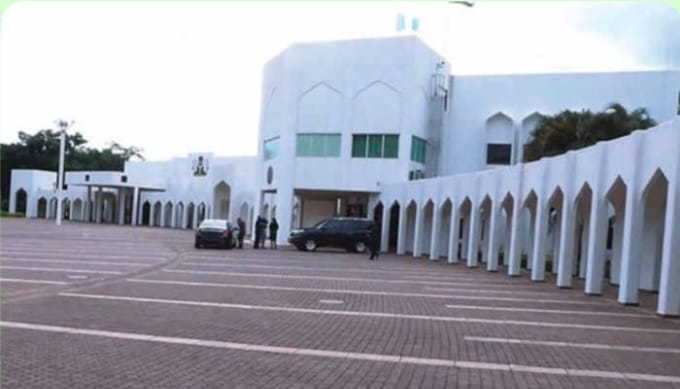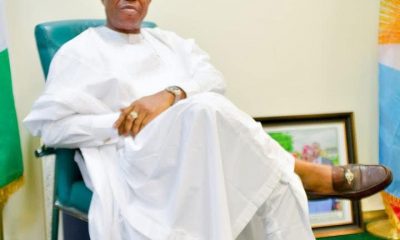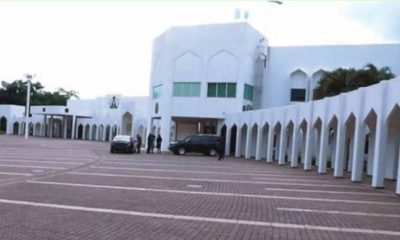society
AIG Paul Odama Resumes At Zone 11, Promises To Reduce Criminal Activities

AIG Paul Odama Resumes At Zone 11, Promises To Reduce Criminal Activities to
Assistant Inspector-General of Police, AIG, Paul Ojeka Odama, has resumed as the new AIG in charge of Zone 11, Police Headquarters in Osogbo, Osun State.
Zone 11 Police Command comprises Osun and Oyo States.
A statement signed by the Zonal Police Public Relations Officer, Ayeni Benjamin on Thursday in Osogbo and made available to online security journalists stated that Odama who joined the Nigeria Police Force in 1990 as Cadet ASP Course 16 member, replaces AIG Olarewaju Oladimeji who has been redeployed to Force Headquarters in Abuja as Force Secretary.
According to Ayeni Benjamin, AIG Odama is a thorough bred police officer who is renowned for diminishing criminal activities with tactical strategies.
He emphasized that with AIG Odama on duty in the zone, “criminals would find Zone 11 very uncomfortable to operate.”
The statement revealed that the new AIG hails from Yala local government area of Cross River State and attended Christ the King Primary School, Okpoma and Mary Knoll College, Ogoja both in Cross River State.
”He has a B.sc in Sociology – ABU Zaria, PGD Management, UNICAL Calabar, MSC Criminology, ABU Zaria, MBA, UNICAL and is also a Chartered Accountant.
“He worked as DCO Birnin Kebbi, DPO Koko Besse, Yauri, Sakaba Divisions and transferred to Zone 7 Abuja as O/C Federal Anti-Robbery and later transferred to Abuja FCT Command and became DPO Maitama, Lugbe, Kwubua, Buwari, Gwagwalada.
“The new AIG was also transferred to Kaduna State and served as DPO Birnin Gwari, Kakuri, Rigachuku, Angwaa Sanusi Divisions.
“Odama, in the cause of policing went on a foreign mission to Pristina, Kosovo and also the United Nations Mission at Monrovia Liberia, UN mission to Estimo, Indonesia in 2008, as District Commander, Oecusse, also known as Oecusse-Ambeno where he was the only black man posted as a District Commander out of 13 District Commands in that country.
“The new AIG bagged several awards and the most proactive DPO in Kaduna State in 2011 and best Area Commander in Osun, 2015.
“Odama has a well-established family life married with children,” the statement explained.
society
OGUN 2027: ABIODUN ISIAQ AKINLADE – A CHANGER OF POLITICAL NARRATIVES IN OGUN WEST

OGUN 2027: ABIODUN ISIAQ AKINLADE – A CHANGER OF POLITICAL NARRATIVES IN OGUN WEST
The Chairman, House Committee on Agricultural Institutions and Colleges, member representing Yewa South/Ipokia Federal Constituency, Right Honorable Akinlade Abiodun Isiaq, remains a political patriot and a true changer of political narratives in Ogun West. Over the years, he has consistently invested in building people and nurturing future leaders, leaving behind a legacy centered on empowerment and human capital development.
There is no doubt that his political dynasty is a proudly made-in-Nigeria project. The foundation he laid and the blueprints he developed during his tenure as a four-term member of the House of Representatives continue to simplify governance and inspire developmental strides across his constituency and beyond.
His roadmap for development has remained a guiding compass toward achieving the Ogun State of his dreams, particularly in improving the lives of the people of Ogun West.
Unarguably, the true test of leadership lies in the number of leaders and successful individuals one has raised. By this standard, Hon. Akinlade stands tall. Many beneficiaries of his mentorship, empowerment initiatives, and strategic support testify to his enduring impact.
Having served diligently during the era of the Action Congress of Nigeria (ACN), which later evolved into the All Progressives Congress (APC), his unmatched antecedents remain etched in the hearts of the people of Ogun West. He continues to serve as a dependable point of contact, known for his pragmatic and solution-driven approach to governance.
Hon. Akinlade has continually reshaped the political narrative in Ogun West through employment facilitation, empowerment programs, and sustained community engagement. His unwavering commitment to the welfare of his people demonstrates his belief that leadership is about service and impact.
As a man of vision and positive ambition for his people, his political journey and aspirations—especially his Governorship ambition—reflect his continued desire to serve at higher levels. With sustained support and collective commitment, the people of Ogun West can continue to reap the dividends of democracy under his leadership.
Daniel Topology De-Prof
society
Panic in Aso Rock Villa as Opposition Leaders Reject Tinubu’s Electoral Law, Announce Next Action

Panic in Aso Rock Villa as Opposition Leaders Reject Tinubu’s Electoral Law, Announce Next Action
By George Omagbemi Sylvester | Published by saharaweeklyng.com
“Opposition coalition vows constitutional resistance, warns new electoral amendments could undermine 2027 polls.”
On 26 February 2026 in Abuja, opposition political parties triggered political turbulence inside the Aso Rock Presidential Villa after publicly *rejecting the recently amended Electoral Act 2026 signed into law by President Bola Tinubu. The rejection came during a high‑profile press conference where leaders described the new law as anti‑democratic and threatening to the integrity of the 2027 general elections.
The opposition, led by figures including former Vice‑President Atiku Abubakar, Ajuri Ahmed of the New Nigeria Peoples Party (NNPP) and other prominent voices, faulted key provisions of the Act; especially clauses allowing manual result collation and limiting real‑time electronic transmission of polling unit results. They argued the law could undermine transparency, deepen electoral manipulation and entrench the governing party’s advantage.
In response, the coalition called for the National Assembly to commence a fresh amendment process and vowed to use constitutional means to resist implementation of the legislation ahead of elections widely seen as decisive for Nigeria’s democratic future.
The confrontation has ignited heated debate among civil society, political analysts and within the ruling party, reflecting widening fault lines over electoral reform and democratic credibility in the run‑up to 2027.
society
Mixed Reactions as Olubadan Oba Rashidi Ladoja Stands to Greet Sheikh Onikijipa at Ramadan Lecture

Mixed Reactions as Olubadan Oba Rashidi Ladoja Stands to Greet Sheikh Onikijipa at Ramadan Lecture
By George Omagbemi Sylvester | Published by saharaweeklyng.com
“A gesture of respect during the Omituntun Ramadan lecture sparks debate over tradition, protocol, and interfaith harmony in Ibadan..”
Ibadan, Nigeria — His Imperial Majesty Oba Rashidi Adewolu Ladoja (Arusa I), the 44th Olubadan of Ibadanland, drew mixed reactions on 26 February 2026 after he stood to greet respected Islamic cleric Sheikh Dr. Sulaiman Faruq‑Onikijipa during the 12th annual Omituntun Ramadan public lecture held in Ibadan. The gesture, captured in a widely circulated video, prompted both applause and debate across social media platforms.
Some attendees and commentators praised the monarch’s act as a powerful demonstration of interfaith respect and unity. One participant told journalists, “It was a beautiful reminder that in times of peace and religious observance, dignity and honour come first,” emphasizing the importance of mutual respect during the holy month of Ramadan.
Others, however, questioned the hierarchical propriety of the act. Social media users debated whether a traditional ruler standing for a religious leader blurred customary lines, suggesting the gesture was unusual in formal cultural contexts.
Religious leaders present framed the moment as a symbol of Ibadan’s enduring tradition of tolerance and peaceful coexistence, emphasizing the positive role such gestures play in fostering community harmony.
The Omituntun Ramadan lecture, held annually, brings together scholars, civic leaders and the public to reflect on moral, social, and spiritual issues during the Islamic holy month. Its prominence in Ibadan underscores the city’s role as a hub of religious dialogue and education. The Olubadan’s gesture, therefore, was not only symbolic but also a reminder of the city’s ongoing commitment to interfaith collaboration and mutual respect in an increasingly pluralistic society.
-

 celebrity radar - gossips6 months ago
celebrity radar - gossips6 months agoWhy Babangida’s Hilltop Home Became Nigeria’s Political “Mecca”
-

 society5 months ago
society5 months agoReligion: Africa’s Oldest Weapon of Enslavement and the Forgotten Truth
-

 society6 months ago
society6 months agoPower is a Loan, Not a Possession: The Sacred Duty of Planting People
-

 news7 months ago
news7 months agoTHE APPOINTMENT OF WASIU AYINDE BY THE FEDERAL GOVERNMENT AS AN AMBASSADOR SOUNDS EMBARRASSING









